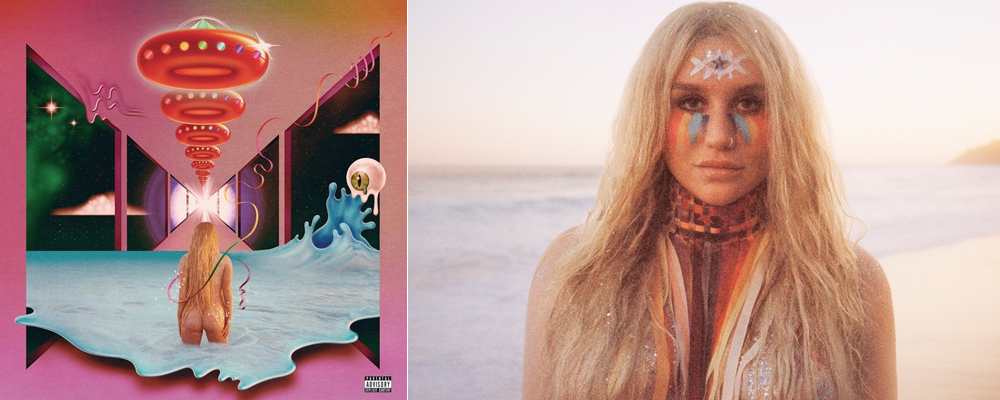Kesha Is Raw and Real on Rebel-Feminist Comeback Album ‘Rainbow’
Jordan Bailey
It’s never an easy task to make a pop comeback. It’s particularly difficult for the now 30-year-old singer Kesha, who, in recent years, has been embroiled in negativity due to her lawsuit against a former producer as well as a stint in rehab. The main story here, though, is that she has been on hiatus from music, the one thing in her life that appeared to keep her grounded. In fact, music has been very good to her. Kesha’s achieved a plethora of No. 1 singles including “Tik Tok,” which at one point was the highest selling digital single in history. That, from 2010’s “Animal,” and “Die Young,” from her follow-up “Warrior,” marked the eighth consecutive single to reach a top ten slot on the Billboard charts. Back now with the release of her third studio album “Rainbow,” Kesha is filled with defiant confidence, knocking down the haters and looking to solidify her place in pop music history.
“Rainbow,” in scope, is about the global fight for peace and equality. “Woman,” for example, is an explosion of feminine empowerment. Featuring the horn section from The Dap-Kings, “Woman” encompasses the full view of what it means to be a female in 2017 — specifically in America, where “pussy-grabbing” has somehow become a topic of conversation. Kesha’s laughter leads right into the boisterous chorus “I’m a motherfucking woman, baby, alright.” More bravado ensues with the bridge, “Don’t buy me a drink, I make my money/Don’t touch my weave, don’t call me ‘honey’.”
“Hymn” is a seemingly odd choice for a single as it sounds like such a clichéd pop song that it tends to take away from the overtly positive message that Kesha intended. The progression is slow, teetering you back and forth yet somehow un-danceable. “This is a hymn, hymn, hymn, for how we live, live, live” closes out the chorus with awkward syntax. Sonics aside though, the significance of “Hymn,” like most other tracks on the album, is worth taking in. “When I sing the words to this song,” says Kesha in an interview with Mic, “I do so as a reminder to myself as much as anyone that we can’t let the haters and the negativity win.” It’s meant to prove to anyone that’s felt damaged, left out or tossed aside that there’s always a place for them at the table of misfits. “Praying,” the lead single, follows a similar, slow-paced path, but this time with a sonic sincerity to back it up. There’s plenty of power behind the singer’s voice here, bringing along with it the gorgeous acoustics of a piano. It’s said this song is in reference to her legal battle with her former producer. This storyline, however, that critics and much of the media seem enthralled by, is the least interesting when looking at the bigger scope of “Rainbow.”
Notable collaborations include more than the aforementioned Dap-Kings horn section. The Eagles of Death Metal, a cheeky rock n’ roll brainchild of Josh Homme of Queens of the Stone Age and singer Jesse Hughes, appear on two tracks (“Let ‘Em Talk” and “Boogie Feet”). Both punk in nature, both as defiant as the rest. In an equally surprising feature, legendary country singer Dolly Parton partakes in “Old Flames (Cant’ Hold a Candle to You).” This song was originally co-written by Kesha’s mother, Pebe Sebert, back in the 1970s, eventually becoming a hit for Parton when she covered it in 1980.
Many of the tracks are intertwined with raw audio of Kesha in the studio joking around between takes, sometimes even mid-song. This adds yet another sense of authenticity to “Rainbow,” an album already rife with plenty of real-talk. It also speaks volumes about how she wants her audience to perceive her, both emotionally and professionally. Kesha’s done with the drama, with the haterz with a “z.” She’s looking to the future with optimism, with a take-no-shit attitude when it comes to the long-held culture of misogyny; that it’s no longer okay to be walked upon; that the fight for equality is raging and that you can find her on a steed at the front of the herd.
“Rainbow” is available Aug. 11 on Apple Music.

